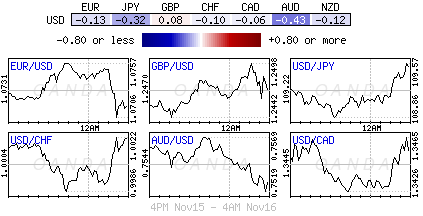Dealers and investors are now seeing a near-certainty of a Fed rate hike next month, with odds of an increase rising to +94% from +86% after Tuesday’s retail-sales report.
Yesterday, U.S retail sales advanced a seasonally adjusted +0.8% last month while September’s gain was boosted to +1%, marking the strongest two-month span in more than 24-months.
Both auto and gas-station sales helped drive October’s growth. Ex-autos, retail sales rose +0.8% and ex-gas climbed +0.7%, which suggests that the U.S consumer spending finished strong in Q3 and has started this final quarter solidly. The Atlanta Fed GDPNow has raised its Q4 GDP forecast to +3.3% from +3.1% on Nov 9.
Fed rhetoric is also helping to push the odds for a hike higher:
Fed’s Rosengren (moderate, FOMC voter): “We should now be raising rates”
Fed’s Tarullo (dovish, FOMC voter): “Rate hikes are now more on the table than they were before, but still grounds for caution in rate hike debate”
Fed’s Kaplan (moderate, non-voter): “The sooner, the better on rate hikes”
Fed’s Bullard (dovish, FOMC voter): “Still leaning toward backing an interest-rate rise increase in Dec, the outlook for monetary policy in the short-term is unchanged following Donald Trump’s victory”
The market will be looking towards Fed Chair Yellen’s testimony tomorrow about the U.S economic outlook before the Joint Economic Committee to shore up their final bets.
1. Equities higher on growth predictions
With the market believing that the prospects for global economic growth are sufficiently strong enough to allow the Fed to tighten is favoring global financial stocks in particular, hurting fixed income and supporting the dollar.
Overnight, the Nikkei Stock Average closed up +1.1%. Australia’s S&P/ASX 200 ended flat, Korea’s KOSPI finished +0.6% higher and Indonesia’s JSX Index gained +1.9%. In Hong Kong, stocks reversed earlier gains in the last hour of trading, dragged lower by a mixed open in European markets.
Note: Japanese financials were the biggest movers, hot on the heels of a Trump win being a boon for global banks on higher rates and reduced regulation. The BoJ continues to keep a close eye on Japanese regional banks; they are concerned that their earnings prospects could worsen with deeper rate cuts.
In Europe, equity indices opened mixed, but currently trading generally lower. Pharma and financials (German profit warnings) are weighing in the Eurostoxx, while homebuilders are adding notable pressure to the FTSE 100.
S&P 500 futures are set to open small down at -0.2%.
Indices: Stoxx50 -0.5% at 3,038, FTSE -0.3% at 6,771, DAX -0.4% at 10,690, CAC 40 -0.4% at 4,519, IBEX 35 flat at 8,684, FTSE MIB +0.2% at 16,721, SMI flat at 7,909, S&P 500 Futures -0.2%
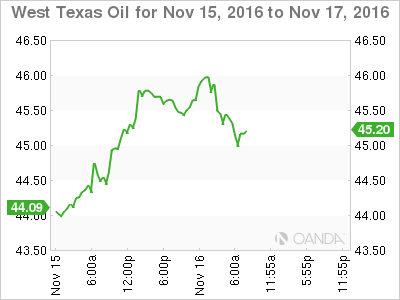
2. Crude Oil retreats after record gains, commodities mixed
Yesterday, crude oil dealers participated in one of the biggest one day rallies this year, a rally supported by news that OPEC members were meeting ahead of an their Nov. 30 to build consensus for a deal to limit production, and by oil pipeline attacks by militants in Nigeria.
It’s not a surprise to see the market give back some of its +5% gain. Adding some pressure is yesterday’s late afternoon API data showing that U.S. crude stocks rose beyond expectations last week to add to an oversupplied market.
Brent crude is down -39c at +$46.56 a barrel (it closed Tuesday +5.7%), while WTI futures are down -47c at +$45.34 a barrel.
A number of OPEC energy ministers are expected to meet “informally” in Doha on Friday to try to build consensus over decisions taken by the full group in September in Algiers. The market is pricing in odds of +50% that a deal would be signed in Vienna on Nov. 30.
Some of the recent high-flying commodities continue to trade heavy. Industrial metals rallied last week on a combination of increased speculative interest and optimism on Trump’s infrastructure pledge.
Ahead of the U.S open, copper and aluminum are extending their retreats from one-year highs reached last week, while zinc continues to retreat from its highest close in six years.
Gold is down -0.2% ($1,225), trading atop of its five-month low Monday – the yellow metal has lost -4.4% this week on the back of a stronger dollar.
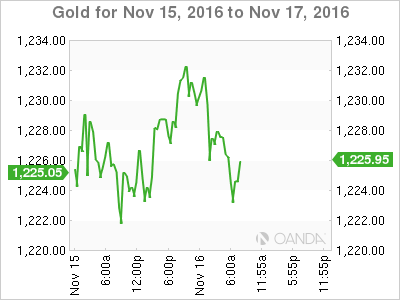
3. Bonds continue their decline after respite
Sovereign bond prices continue their fall after a yesterday’s brief break. Yields on German bunds and UK 10-Year gilts have backed to +0.329% and +1.412% respectively.
In Japan, JGB’s 10-Year bonds fell for a fifth day, lifting their yield to +0.035%. The BoJ is closely watching the JGB market; there is some speculation that the BoJ might purchase more bonds to bring the yield lower towards target. They had been trading in negative territory for the past two months.
Stateside, U.S 10-year Treasury yields have edged up to around +2.245%, or +4bps overnight – the benchmark has backed up +40bps since Trump’s election.
Comments from Fed’s Bullard (dovish, voter) in London this morning is also lending weight to the short end of the U.S curve. He indicated ‘one rate hike’ would be enough to bring U.S monetary policy to neutral stance and that President-elect Trump’s increased infrastructure spending might increase growth from 2018.
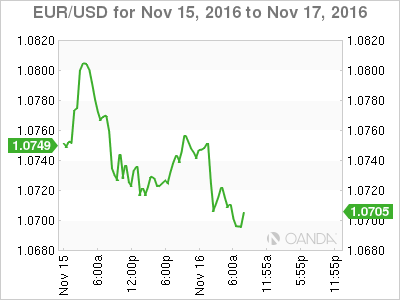
4. Dollar by the numbers
The mighty buck continues its upward trend on the prospect of fiscal spending projects under Trump and a tighter Fed policy.
Thus far, the dollar has reached its highest level in 12-months against the EUR and a five-and-a-half month high against JPY. Stronger data, like yesterday’s retail sales and rate differential should continue to support the USD against G10 low yielding currencies like JPY and CHF.
EUR/USD is down -0.2% to €1.0700, its lowest since early December 2015. USD/JPY is up +0.6% to ¥109.60, its strongest since early June.
The pound (£1.2453) has edged up a tad ahead of the U.S open after data showed that the U.K. unemployment rate fell to +4.8% in the three-months to September, down from an expected unchanged rate of +4.9%. The Brexit overhang and the pounds vulnerability to swings in risk appetite is expected to limit sterling moves higher.
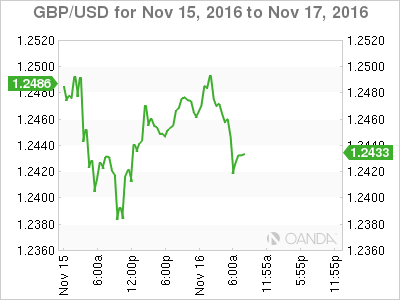
5. German Bank Profit Warnings
Yesterday it was the BoJ who sounded concerns about domestic bank profitability and the long-term implications of negative rates. Today, it’s the Bundesbank turn.
Bundesbank Board member Dombret warned this morning of “exceedingly weak” profitability among German banks in the low interest rate environment. He says “banks might encounter serious problems if rock-bottom rates persist.” Still he says that “for now we can cautiously sound the all clear,” particularly for smaller banks.
